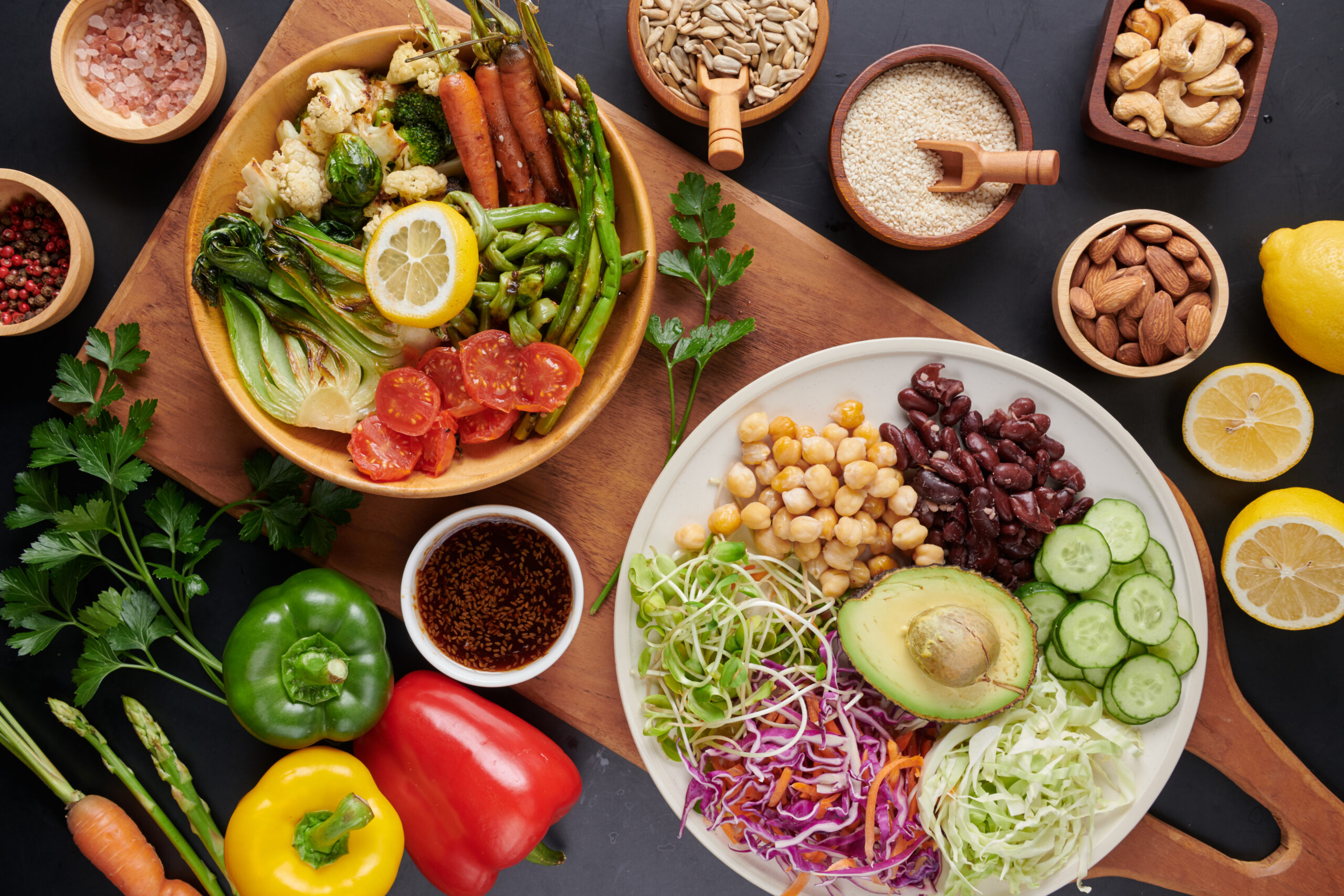Although I’m best known in the world of coaching and Yoga, nutrition is a large part of what a healthy human entails. Eating a healthy and balanced diet is mainly about understanding the food and drinks that you ingest every day and how they provide you the energy and nutrients you need to be healthy. Nutrients allow proper bodily function, metabolism, growth and repair of all your body’s cells. The stages of nutrition are ingestion, digestion, absorption, transportation, assimilation, synthesis and excretion.
According to a study conducted in 2015 by the Academy of Nutrition and Dietetics, the average person lacks understanding regarding human biology and physiology. Understanding nutrition terms and what food compounds are in your body is the most basic information we must know in order to make educated choices. There are two different types of nutrients, macronutrients are the components in food that are needed by the body in larger quantities and micronutrients are needed in much smaller quantities.
There are three types of macronutrients: carbohydrates, proteins and fats. Each of these provide different materials for your body needed to perform various functions. Carbohydrates and proteins provide the body 4 calories per gram and fat, the most calorie-dense of the macronutrients, has 9 calories per gram. Alcohol, although not discussed in this article, has 7 calories per gram. When you look at the labels placed on the foods you purchase you can see the information broken down in grams.
Micronutrients (Vitamins and Minerals) are food components that help support normal physiologic function and your overall health; They support your metabolism, neurological functions and basic bodily functions. Because they cannot be made or synthesized by the body (except for vitamin D from the sun), they must come from the foods that we eat. Adequate intake is necessary to prevent deficiency, promote optimal health, improve nutrient absorption, promote fat loss and support muscle gain.
Macronutrients
Carbohydrates, popularly known as carbs, are the main source of energy for your body; energy converted from carbs is used much like gasoline or diesel are used to fuel an engine. Foods such as fruits, beans, vegetables, nuts, grains, processed grains and root vegetables deliver sugars and/or starches which are digestible carbohydrates that provide energy and fiber which is a carbohydrate that is not digestible by the body.
Carbs are the macronutrient most efficiently converted to energy, therefore it is the body’s main source of fuel when your conducting basic functions such as breathing, thinking, swallowing, etc. Carbs provide your body with the energy needed for daily activities like walking, talking, sitting or standing; and more complex activities such as running, jumping, throwing, lifting heavy objects, etc. Your body needs a constant calorie intake. Even at rest, energy is needed to perform vital functions such as digesting food, keeping your body at the right temperature, keeping your heart beating and your lungs processing air.
Protein provides your body with 23 building blocks called amino acids. Of those amino acids, 7 are essential to your body, which means they must be consumed through food, as your body is unable to produce (synthesize) them. Proteins are needed for crucial processes in the body: such as development, growth and maintenance of all the cells and tissues in your body, maintenance of immune cells to fight infection and inflammation, repair of muscles, etc. The full chain of amino acids can be found in animal products such as beef, pork, chicken, wild game meats, fish, seafood, eggs and dairy products. Amino acids can also be found in some fruits, vegetables, leafy greens, nuts, seeds, beans and other legumes. In plant-based protein, amino acids form a different chain and therefore need to be varied in order to receive the proper amount of all amino acids.
Fats are a compound in food that provides structure to your body’s cells and cushions membranes to help prevent damage. Your brain is composed of 60% fat, this means that an adequate fat supply is needed in order to maintain optimal brain function. Fat is also essential in your diet as a means to absorb fat-soluble vitamins (Vitamins A, D, E, K). Fat can be found in oil, meats, nuts, milk, cheese, meat, poultry and fish; fruits such as avocados provide healthy amounts of fats as well.
Much like carbs, there are different types of fats. Saturated fats are solid at room temperature, come mostly from animal sources and are the ones the negatively affect your cholesterol. Trans Fats are scientifically made to resemble saturated fats by hydrogenating unsaturated fat and giving it the consistency of saturated fat. They are considered the worse for your heart and cardiovascular system. The fats found in plant-based food and fish are the fats we typically associate with healthy fats and they are monounsaturated and polyunsaturated fats; these contain the Omega 3 and Omega 6 which help regulate our immune function, develop our vision and nervous system.
Micronutrients
Vitamins are essential molecules that aid your body in energy production, wound healing, bone formation, immunity, and eye and skin health. Your body is unable to synthesize vitamins quickly enough, therefore you need vitamins in your diet to meet your daily needs. As previously mentioned, there are vitamins absorbed through the fat that we ingest and others through the water we consume. Some of these vitamins can temporarily be stored in fatty tissue and stay longer in the system, however we tend to excrete any excess of fat-soluble vitamins.
A low-fat diet can lead to deficiencies of fat-soluble vitamins, since we won’t have the proper way to absorb these vitamins. Water soluble vitamins rely on molecular “carriers” in order to be both a passive and active absorbed. Water soluble vitamins are not stored in high amounts within the body, as they are eliminated through the kidneys when not absorbed.
| VITAMINS | ||
| WATER SOLUBLE VITAMINS | WATER SOLUBLE VITAMINS | FAT SOLUBLE VITAMINS |
| Vitamin B1 (Thiamine) | Vitamin B6 (Pyridoxine) | Vitamin A (Retinoids) |
| Vitamin B2 (Riboflavin) | Vitamin B9 (Folic acid/Folate) | Vitamin D (Calciferol) |
| Vitamin B3 (Niacin) | Vitamin B12 (Cobalamin) | Vitamin E (tocopherol) |
| Vitamin B5 (Pantothenic acid) | Vitamin H (Biotin) | Vitamin K |
| Vitamin C (Ascorbic acid) | ||
The minerals we consume through the foods we ingest are used for a variety of physiological processes such as building blood and bone, making hormones, regulating heartbeat, and more. There are two types of minerals needed in our bodies, macrominerals (calcium, phosphorus, magnesium, sodium, potassium, chloride, and sulfur) are needed in large amounts and Trace minerals (iron, manganese, copper, iodine, zinc, cobalt, fluoride, and selenium) are needed in very small amounts.
Micronutrient deficiencies are usually due to not taking in enough nutrient dense calories in our day to day diet. According to the CDC a large number of Americans show deficiencies in Iron, Vitamin D and all B Vitamins. Nutrient deficiencies are more common among certain populations; low incomes populations (may not have the education or means to consume as many healthy foods), the elderly (who consume less overall calories, making it difficult to meet their daily nutritional requirements), athletes (who have a higher requirement for many nutrients) and children (as they are in a growth stage and need the nutrition to develop properly). When we diet and severely reduce food intake in an effort to drop body fat, we’re almost assured a nutrient deficiency; as food intake goes down, nutrient intake does too.
In order to take in the proper amount of nutrition make sure that you are combining foods that are nutrient dense sources of the right types of fats, carbs and protein into all of your meals. Make sure you are staying well hydrated to ensure proper function and nutrient absorption.

